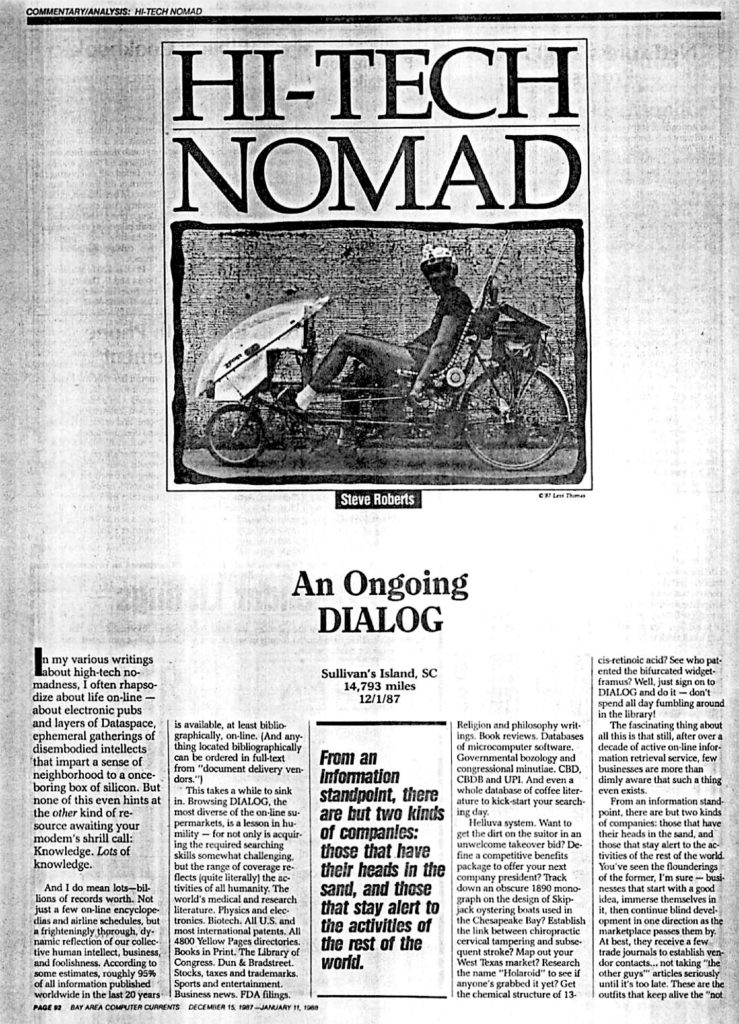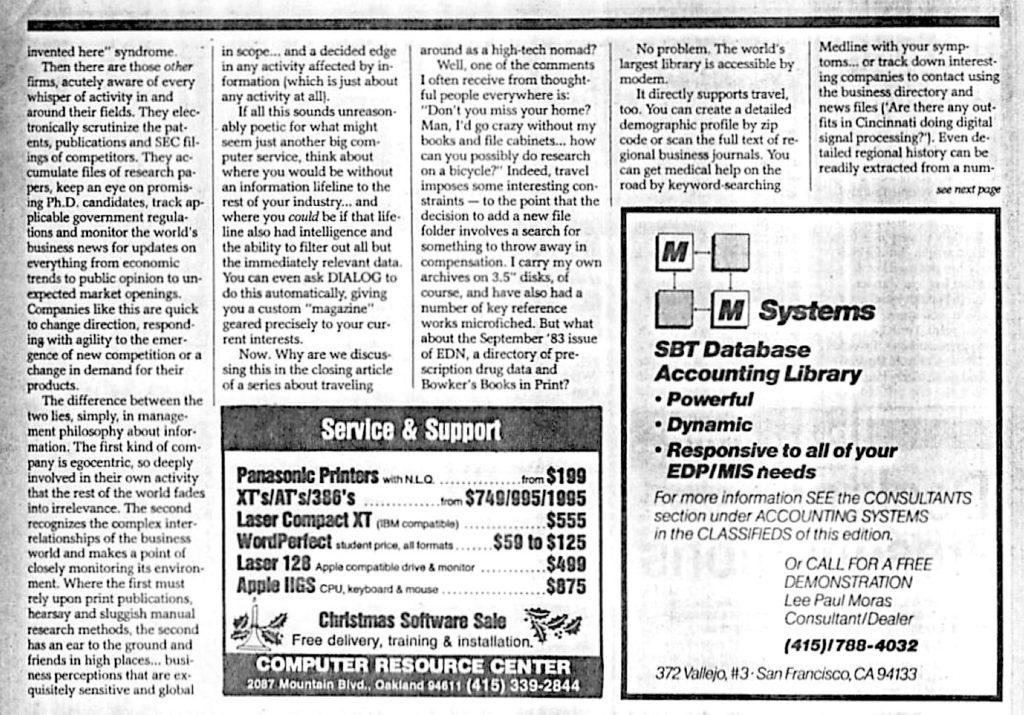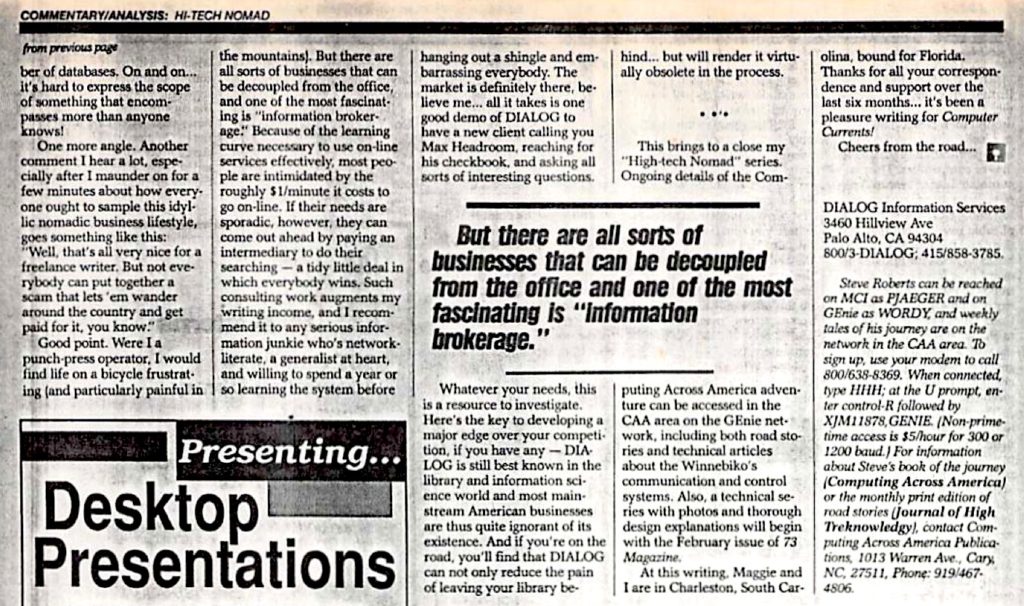
An Ongoing DIALOG
Before taking off on the bicycle in 1983, I had a little business called the Information Institute (a bit grandiose). I was mostly doing freelance engineering and tech writing, but was also an information broker, leveraging my familiarity with the DIALOG system to do research for clients. At the time of this article, four years later, the landscape had changed considerably… and this article adds “online searching” to the toolkit that I was presenting for those interested in the digital nomad lifestyle. This final article in my Computer Currents series was written on the road at Sullivan’s Island, South Carolina while recovering from a bicycle accident in Whiteville.
by Steven K. Roberts
Computer Currents
December 1, 1987
In my various writings about high-tech nomadness, I often rhapsodize about life on-line — about electronic pubs and layers of Dataspace, ephemeral gatherings of disembodied intellects that impart a sense of neighborhood to a once-boring box of silicon. But none of this even hints at the other kind of resource awaiting your modem’s shrill call: knowledge. Lots of knowledge.
And I do mean lots — billions of records worth. Not just a few on-line encyclopedias and airline schedules, but a frighteningly thorough, dynamic reflection of our collective humun intellect, business, and foolishness. According to some estimates, roughly 95% of all information published worldwide in the last 20 years is available, at least bibliographically, online. (And anything located bibliographically can be ordered in full-text from “document delivery vendors.”)
This takes a while to sink in. Browsing DIALOG, the most diverse of the online supermarkets, is a lesson in humility — for not only is acquiring the required searching skills somewhat challenging, but the range of coverage reflects (quite literally) the activities of all humanity. The world’s medical and research literature. Physics and electronics. Biotech. All U.S. and most international patents. All 4800 Yellow Pages directories. Books in Print. The Library of Congress. Dun & Bradstreet. Stocks, taxes and trademarks. Sports and entertainment. Business news. FDA filings. Religion and philosophy writings. Book reviews. Databases of microcomputer software. Governmental bozology and Congressional minutiae. CBD, CBDB and UPI. And even a whole database of coffee literature to kick-start your searching day.
Helluva system. Want to get the dirt on the suitor in an unwelcome takeover bid? Define a competitive benefits package to offer your next company president? Track down an obscure 1890 monograph on the design of Skipjack oystering boats used in the Chesapeake Bay? Establish the link between chiropractic cervical tampering and subsequent stroke? Map out your West Texas market? Research the name “Holaroid” to see if anyone’s grabbed it yet? Get the chemical structure of 13-cis-retinoic acid? See who patented the bifurcated widgetframus? Well, just sign on to DIALOG and do it — don’t spend all day fumbling around in the library!
The fascinating thing about all this is that still, after over a decade of active on-line information retrieval service, few businesses are more than dimly aware that such a thing even exists.
From an information standpoint, there are but two kinds of companies: those that have their heads in the sand, and those that stay alert to the activities of the rest of the world. You’ve seen the flounderings of the former, I’m sure — businesses that start with a good idea, immerse themselves in it, then continue blind development in one direction as the marketplace passes them by. At best, they receive a few trade journals to establish vendor contacts… not taking “the other guys'” articles seriously until it’s too late. These are the outfits that keep alive the “not invented here” syndrome.

Then there are those other firms, acutely aware of every whisper of activity in and around their fields. They electronically scrutinize the patents, publications and SEC filings of competitors. They accumulate files of research papers, keep an eye on promising PhD candidates, track applicable government regulations, and monitor the world’s business news for updates on everything from economic trends to public opinion to unexpected market openings. Companies like this are quick to change direction, responding with agility to the emergence of new competition or a change in demand for their products.
The difference between the two lies, simply, in management philosophy about information. The first kind of company is egocentric, so deeply involved in their own activity that the rest of the world fades into irrelevance. The second recognizes the complex interrelationships of the business world and makes a point of closely monitoring its environment. Where the first must rely upon print publications, hearsay and sluggish manual research methods, the second has an ear to the ground and friends in high places… business perceptions that are exquisitely sensitive and global in scope… and a decided edge in any activity affected by information (which is just about any activity at all).
If this all sounds unreasonably poetic for what might seem just another big computer service, think about where you would be without an information lifeline to the rest of your industry… and where you could be if that lifeline also had intelligence and the ability to filter out all but the immediately relevant data. You can even ask DIALOG to do this automatically, giving you a custom “magazine” geared precisely to your current interests.
Now. Why are we discussing this in the closing article of a series about traveling around as a high-tech nomad?
Well, one of the comments I often receive from thoughtful people everywhere is: “Don’t you miss your home? Man, I’d go crazy without my books and file cabinets… how can you possibly do research on a bicycle?” Indeed, travel imposes some interesting constraints — to the point that the decision to add a new file folder involves a search for something to throw away in compensation. I carry my own archives on 3.5″ disks, of course, and have also had a number of key reference works microfiched. But what about the September ’82 issue of EDN, a directory of prescription drug data, and Bowker’s Books in Print?
No problem. The world’s largest library is accessible by modem.
It directly supports travel, too. You can create a detailed demographic profile by ZIP code or scan the full text of regional business journals. You can get medical help on the road by keyword-searching Medline with your symptoms… or track down interesting companies to contact using the business directory and news files (“Are there any outfits in Cincinnati doing digital signal processing?”). Even detailed regional history can be readily extracted from a number of databases. On and on… it’s hard to express the scope of something that encompasses more than anyone knows!

One more angle. Another comment I hear a lot, especially after I maunder on for a few minutes about how everyone ought to sample this idyllic nomadic business lifestyle, goes something like this: “Well, that’s all very nice for a freelance writer. But not everybody can put together a scam that lets ’em wander around the country and get paid for it, you know.”
Good point. Were I a punch-press operator, I would find life on a bicycle frustrating (and particularly painful in the mountains. But there are all sorts of businesses that can be decoupled from the office, and one of the most fascinating is “information brokerage.” Because of the learning curve necessary to use services effectively, most people are intimidated by the roughly $1/minute it costs to go on-line. If their needs are sporadic, however, they can come out ahead by paying an intermediary to do their searching — a tidy little deal in which everybody wins. Such consulting work augments my writing income, and I recommend it to any serious information junkie who’s network-literate, a generalist at heart, and willing to spend a year or so learning the system before hanging out a shingle and embarrassing everybody. The market is definitely there, believe me… all it takes is one good demo of DIALOG to have a new client calling you Max Headroom, reaching for his checkbook, and asking all sorts of interesting questions.
Whatever your needs, this is a resource to investigate. Here’s the key to developing a major edge over your competition, if you have any — DIALOG is still best known in the library and information science world and most mainstream American businesses are thus quite ignorant of its existence. And if you’re on the road, you’ll find that DIALOG can not only reduce the pain of leaving your library behind… but will render it virtually obsolete in the process.
This brings to a close my “High-tech Nomad” series. Ongoing details of the Computing Across America adventure can be accessed in the CAA area on the GEnie network, including both road stories and technical articles about the Winnebiko’s communication and control systems. Also, a technical series with photos and thorough design explanations will begin with the February issue of 73 Magazine.
At this writing, Maggie and I are in Charleston, South Carolina, bound for Florida. Thanks for all your correspondence and support over the last six months… it’s been a pleasure writing for Computer Currents! Cheers from the road…
[obsolete contact info redacted]


You must be logged in to post a comment.